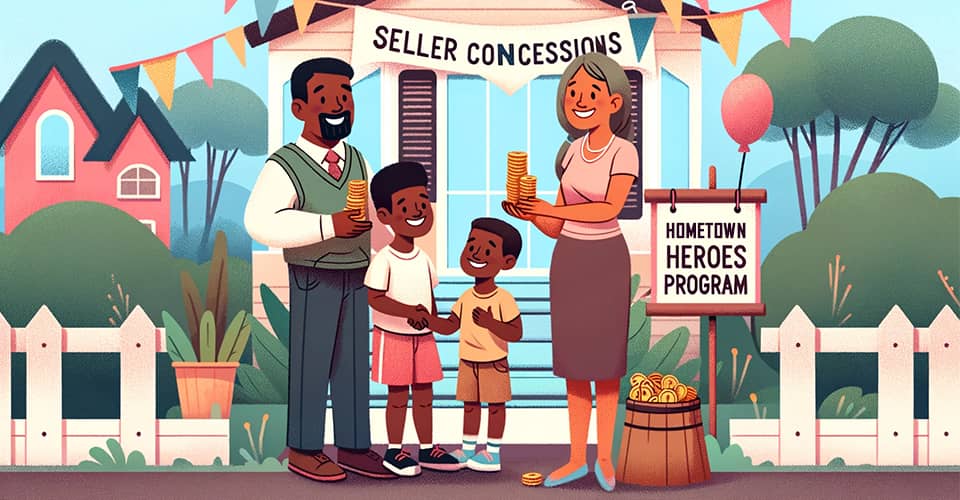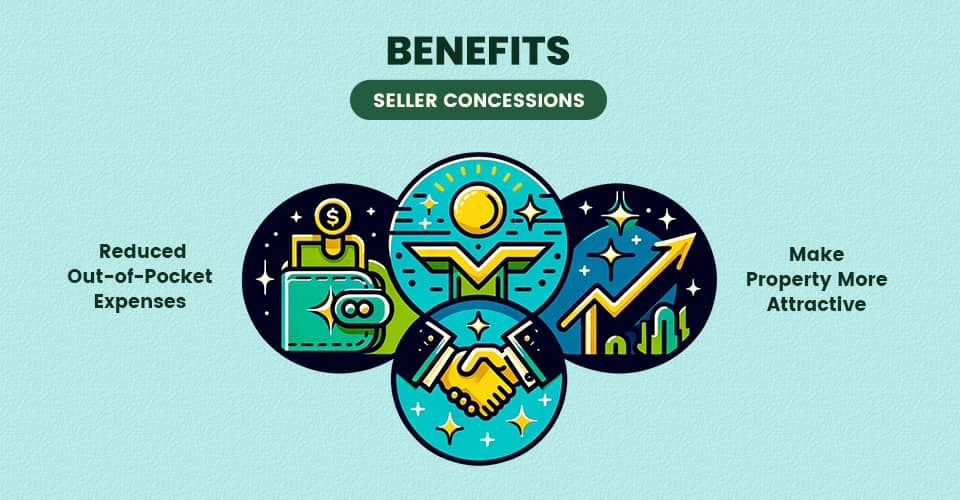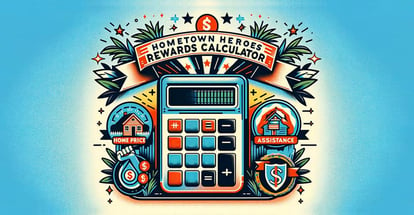Florida Hometown Heroes Program Seller Concessions Guide
Dive into the Florida Hometown Heroes Program Seller Concessions Guide, tailored for program participants seeking to maximize their benefits when purchasing a home.
This guide will navigate you through the intricacies of leveraging seller concessions to your advantage, ensuring that you, our community's heroes, can make informed and financially savvy decisions.
Get ready to unlock the potential of seller concessions to make your home-buying journey smoother and more affordable.
Table of Contents
Hometown Heroes Seller Concessions At-A-Glance
The Florida Hometown Heroes Program offers a significant leg-up for the state’s essential workers aiming to purchase their first home.
Understanding and effectively using seller concessions within this program can vastly reduce the financial burden of the home-buying process, whether through FHA, VA, or conventional loan mechanisms.
Here’s what you need to take away:
-
Seller concessions can cover a wide range of closing costs, potentially lowering the cash needed at the time of purchase for program participants.
-
FHA loans allow seller concessions up to 6% of the home’s sale price, making a substantial difference in upfront costs for Hometown Heroes.
-
VA loans offer even more flexibility, with the possibility of covering non-traditional costs up to 4%, presenting a unique opportunity for veteran participants to preserve savings or allocate funds toward other expenses.
-
Conventional loans have varying caps on seller concessions based on the down payment amount, with a maximum of 3% to 9% for personal residences and a more conservative 2% for investment properties when the down payment is 15% or more.
-
Strategically, seller concessions can make a property more attractive to buyers and provide sellers with a faster transaction, but they require careful consideration and negotiation.
- Limitations do exist; the seller concessions cannot exceed actual closing costs and cannot result in cash back to the buyer, emphasizing the importance of accurate cost estimation.
For Florida’s Hometown Heroes, blending the benefits of the state’s supportive program with the strategic use of seller concessions can make homeownership more accessible and financially sustainable.
It’s crucial to engage with knowledgeable real estate professionals to navigate these options successfully and tailor the home-buying strategy to your unique financial situation and the ever-evolving housing market conditions.

What Are Seller Concessions in Florida?
When navigating the real estate market in Florida, both buyers and sellers look for ways to facilitate the transaction in a manner that’s beneficial for their respective positions.
One common strategy that emerges in this negotiation process is the use of seller concessions. But what exactly are seller concessions, and how do they work in the Sunshine State?
Seller concessions are agreements where the seller of a property agrees to pay a portion of the buyer's closing costs.
In Florida, as in other states, these concessions can be used to entice a buyer to proceed with the purchase, to adjust the effective selling price, or to speed up the sale. They're a tool that can make real estate transactions smoother but come with rules and limitations.
Seller concessions may cover various expenses on behalf of the buyer. These can include:
- Title insurance fees
- Processing fees
- Attorney fees
- Inspection fees
- Appraisal fees
- Transfer taxes
- Points charged by the mortgage company to lower the interest rate
In Florida, the amount that a seller can contribute is often capped and depends on the type of loan the buyer secures.
For example, with a conventional loan, the limit on seller concessions can range from 3% to 9% of the home's purchase price, depending on the down payment amount.
FHA loans have their own set of rules, usually capping the seller's assistance at 6% of the home’s sale price, while VA loans might allow for up to 4%.

Understanding Seller Concessions With FHA Loans
Seller concessions are a valuable tool for buyers utilizing the FHA loan program, and this can be especially beneficial for participants in the Florida Hometown Heroes Program.
FHA loans are popular among first-time homebuyers and those with lower down payments because of their more lenient lending standards and the ability to incorporate seller concessions into the deal.
For the Florida Hometown Heroes Program, which aims to assist essential service workers in purchasing their first home, the FHA seller concessions can significantly reduce the amount of cash needed at closing.
Let's explore how this works in detail.
Understanding FHA Seller Concessions
An FHA loan requires a minimum down payment of 3.5% of the purchase price, which is already lower than many conventional loan requirements.
Seller concessions are additional aspects of the home purchase deal where the seller agrees to pay certain costs on behalf of the buyer.
Under FHA guidelines, the seller can contribute up to 6% of the home's sale price towards the buyer's closing costs, prepaid items, and discount points.
Components of Seller Concessions
-
Closing Costs - These include a variety of fees and expenses due at the closing of a real estate transaction. For an FHA loan, the seller can pay for items such as appraisal fees, title insurance, attorney fees, and lender's fees.
-
Prepaid Items - These are upfront costs associated with the home purchase, such as prepaid interest, property taxes, and homeowners insurance. By having the seller pay these, the buyer can alleviate the immediate financial burden during the transition into homeownership.
- Discount Points - These are fees paid directly to the lender at closing in exchange for a reduced interest rate on the mortgage, known as "buying down" the rate. One point equals 1% of the loan amount. With seller concessions, a buyer could potentially lower their interest rate, thereby reducing monthly mortgage payments.
Utilization by Florida Hometown Heroes Program Participants
The Florida Hometown Heroes Program supports eligible workers—like law enforcement officers, educators, healthcare professionals, and other essential service roles—by offering down payment and closing cost assistance.
When combined with an FHA loan's seller concessions, participants can potentially cover all their closing costs and prepaids through the seller's contributions, which can be up to 6% of the purchase price.
This means a buyer using the Hometown Heroes Program could use the funds from the program to cover the down payment while having the seller pay for most, if not all, of the other upfront costs.
This synergy can make homeownership accessible sooner for hometown heroes by minimizing the cash required at closing.
Strategic Benefits
For sellers, offering concessions can make their property more attractive to buyers who might be stretching their budgets to afford homeownership.
For buyers, especially those in the Hometown Heroes Program, utilizing seller concessions means they can preserve their savings, which can be particularly useful for unexpected expenses or home improvements after purchase.
Considerations and Limitations
It's important to note that there are some limitations. The 6% cap on seller concessions means that buyers cannot receive cash back at closing; concessions can only be applied to actual costs.
Additionally, not all sellers may be willing or able to offer concessions, especially in competitive markets where they might receive offers that don't require such assistance.
Conclusion
In conclusion, FHA seller concessions are a powerful tool that can be leveraged by Florida Hometown Heroes Program participants to reduce the upfront financial burden of purchasing a home.
By strategically using seller concessions to cover closing costs, prepaid items, and discount points, these hometown heroes can attain the dream of homeownership with less financial strain.
As always, it's advisable for buyers to work with a knowledgeable real estate professional and lender to navigate the specifics of these benefits effectively.
Understanding Seller Concessions With VA Loans
Seller concessions are a significant benefit in real estate transactions, particularly for those who have served in the military and are utilizing VA loans.
The Florida Hometown Heroes Program, which aims to assist essential service workers, including military personnel, in purchasing their first home, can be greatly complemented by the utilization of VA seller concessions.
Understanding VA Seller Concessions
VA loans stand out in the mortgage landscape due to their unique benefits for veterans and active-duty service members. One of the most notable advantages is the possibility of no down payment requirement.
Furthermore, VA loans allow for seller concessions, which can cover a wide range of potential costs associated with purchasing a home.
Seller concessions on a VA loan can be used for:
-
Closing Costs - Legal fees, appraisal fees, recording fees, and any other costs incurred during the closing of a home sale.
-
Prepaid Items - Insurance, taxes, and accrued interest that need to be paid in advance.
- Discount Points - Fees paid to reduce the interest rate on the loan.
Unlike other loan types, VA loans offer the flexibility of unlimited seller concessions; however, there is a caveat—only up to 4% can go towards items that aren't traditional closing costs, such as paying off debts on behalf of the buyer.
Utilization by Florida Hometown Heroes Program Participants
For participants of the Florida Hometown Heroes Program who are also eligible for VA loans, this presents an opportunity to significantly reduce the upfront costs associated with purchasing a home.
Since the program already provides down payment and closing cost assistance, coupling this with seller concessions can essentially diminish the cash required at closing to a minimal amount, if not zero.
For instance, a seller could potentially cover not only the standard closing costs but also pre-payments for insurance and taxes, and even pay points to lower the interest rate on the mortgage.
This can amount to a substantial financial advantage for the buyer, enabling them to allocate savings towards other expenses such as furniture, renovations, or an emergency fund.
Strategic Benefits for Hometown Heroes
The strategic use of seller concessions in a VA loan can be especially beneficial for "Hometown Heroes" who may have limited resources for an upfront cash outlay. It can make the transition to homeownership smoother by preserving personal funds.
Additionally, the flexibility to use concessions to pay down debt can help improve the buyer's financial situation by reducing monthly obligations.
Considerations and Limitations
While the potential for seller concessions with VA loans is vast, buyers must approach this option strategically. Not all sellers are willing to offer high concessions, especially in competitive markets.
Also, the 4% cap on certain non-closing cost items requires careful calculation to ensure that the concessions are used effectively and in compliance with VA regulations.
Buyers using VA loans should also be aware that any concessions exceeding the actual costs of prepaids, closing costs, and discount points cannot be received as cash back.
These funds must be applied to the transaction costs or used to pay upfront fees, debts, or to permanently buy down the interest rate.
Conclusion
In summary, VA seller concessions can significantly benefit participants in the Florida Hometown Heroes Program.
By leveraging these concessions, hometown heroes can reduce or eliminate the immediate financial burden of purchasing a home, allowing for a smoother transition into homeownership and a better allocation of their financial resources.
Veterans and eligible service members are encouraged to consult with real estate professionals who understand the intricacies of VA loans and can help navigate the process to maximize the benefits of seller concessions.
With careful planning and negotiation, VA seller concessions can provide a powerful financial strategy for Florida's hometown heroes looking to purchase a home.
Understanding Seller Concessions With Conventional Loans
Seller concessions are an important factor for homebuyers to consider when entering the real estate market with a conventional mortgage.
These concessions are part of the negotiation process and can significantly affect the overall affordability and attractiveness of a property purchase.
Here’s how seller concessions work with a Conventional Mortgage, particularly in the context of the Florida Hometown Heroes Program.
In the realm of conventional mortgages, seller concessions are contributions that the seller agrees to pay toward the buyer's closing costs, prepaid items, and in some cases, discount points.
These concessions are negotiated during the sale process and are included in the purchase agreement. They can be a decisive factor for buyers who might have enough for a down payment but are stretched thin by additional closing costs.
For homebuyers using a conventional loan, the maximum seller contribution toward closing costs and other specified items can vary based on the down payment.
If you're a homebuyer who can afford a down payment of 15% or more, the rules are slightly different when compared to those who put down less.
Florida Hometown Heroes Program - Conventional Loan
The Florida Hometown Heroes Program is designed to support essential workers in purchasing a home. However, it's important to clarify that this program is generally intended to assist those buying a primary residence, not an investment property.
With that in mind, if you are looking at investment properties and your financing resembles the conventional loan structure of the Hometown Heroes Program, here’s how the seller concessions would work:
-
Downpayment - With a 15% or more down payment on a property, you are considered to be in a strong equity position from the start.
-
Contribution Type - The seller can contribute to various buyer costs, which include closing costs (like title insurance and origination fees), prepaid items (such as property taxes and homeowners insurance), and discount points (a form of prepaid interest that buyers use to reduce their mortgage interest rate).
- Max Seller Contribution - For investment properties where the buyer is making a down payment of 15% or more, the maximum seller concession is capped at 2%. This is relatively low compared to what might be available for primary residences or for buyers making smaller down payments. The reason for this cap is to ensure the buyer has sufficient "skin in the game" and to protect the lender's investment in the property.
Understanding the Impact
For homebuyers, particularly those considering the conventional loan path for an investment property, it’s crucial to understand how these concessions affect your financial picture:
-
Reduced Out-of-Pocket Expenses - Seller concessions can lower the immediate out-of-pocket expenses, making it possible to preserve cash for repairs, renovations, or other investments.
-
Negotiation Strategy - Knowing the seller concession limits can help you strategize your offer. If the maximum concession is 2%, you might negotiate the purchase price with this consideration in mind.
- Overall Cost - While concessions can reduce upfront costs, they do not reduce the property price. The lower the concession, the more cash you’ll need at closing.
Understanding Seller Concessions With USDA Loans
For individuals looking to purchase a primary home in a rural or suburban area, the USDA loan program offers an advantageous route with its flexible terms and financial benefits.
Understanding the intricacies of seller concessions within the USDA loan framework can provide significant leverage to homebuyers.
Here's how seller concessions work with a USDA loan for a primary home.
USDA Loan Seller Concessions
The USDA loan is a government-backed loan program intended for primary home buyers in designated rural and some suburban areas, which comes with the benefit of $0 down payment. It is designed to promote homeownership for those with low to moderate income.
One of the attractive features of the USDA loan is the possibility of having the seller contribute to various buyer-related costs.
USDA Loan Characteristics for Primary Home
-
Downpayment - USDA loans are renowned for not requiring a down payment from the homebuyer, which significantly lowers the barrier to homeownership for many individuals.
-
Contribution Type - Seller concessions for USDA loans are quite generous and versatile. Sellers can contribute to closing costs (such as lender fees, title insurance, and recording fees), prepaid items (like taxes and insurance), discount points, and even significant expenses such as the buyer's debts to help them qualify for the loan.
- Max Seller Contribution - The USDA loan program is unique in that it allows a maximum seller concession of up to 6% of the home's purchase price. This high percentage is particularly beneficial because it can cover a wide range of expenses and potentially reduce the amount of cash a buyer needs to bring to closing.
Impact of USDA Seller Concessions for Homebuyers
For buyers using a USDA loan, understanding the impact of seller concessions is crucial:
-
Minimized Closing Costs - The ability to have up to 6% in seller concessions means that, in many cases, the buyer's closing costs and prepaid items can be significantly reduced or completely covered.
-
Flexibility in Negotiations - When negotiating the purchase of a home, knowing that there’s room for up to 6% in concessions can inform your strategy. For example, if a seller is firm on their price, they might be more flexible on concessions which can still make the deal attractive for a buyer.
-
Debt Payoff Possibility - The USDA’s allowance for seller concessions to be used for debt payoff is particularly notable. It can enable buyers to improve their debt-to-income ratio, potentially qualifying for a higher loan amount or better terms.
- Closing the Deal - In competitive markets, a seller's willingness to offer concessions can be the deciding factor for a buyer when choosing between multiple properties.
With over 50 years of mortgage industry experience, we are here to help you achieve the American dream of owning a home. We strive to provide the best education before, during, and after you buy a home. Our advice is based on experience with Phil Ganz and Team closing over One billion dollars and helping countless families.

About Author - Phil Ganz
Phil Ganz has over 20+ years of experience in the residential financing space. With over a billion dollars of funded loans, Phil helps homebuyers configure the perfect mortgage plan. Whether it's your first home, a complex multiple-property purchase, or anything in between, Phil has the experience to help you achieve your goals.


 By
By  Edited by
Edited by 






